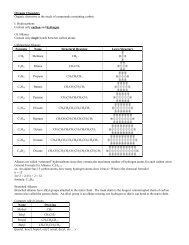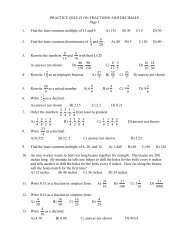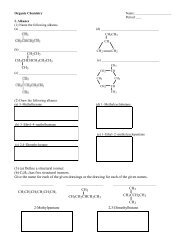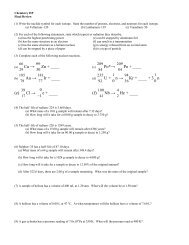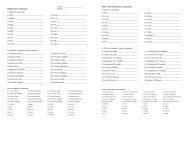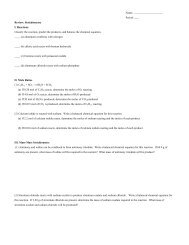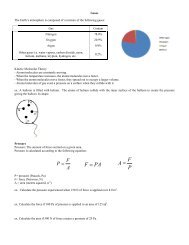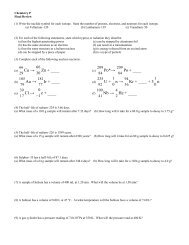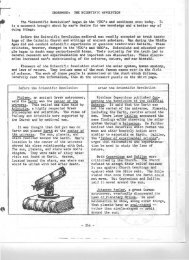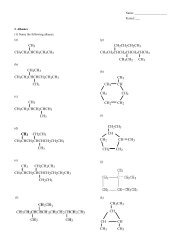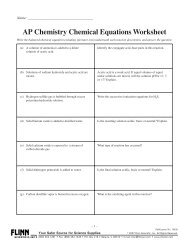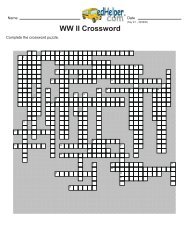Dominican Republic – When we left in 1924, we gave them a present: a national guard and,soon enough, a nasty dictator who ruled until 1961, Trujillo. Nicaragua – Troops occupied from 1912 – 1925 and then returned for the civil war in 1926. Weleft as a result of anti-imperialist opposition, but left behind (again) a nat’l guard headed bySomoza, who ruled (horribly) until 1979. Haiti – Troops occupied from 1915 – 1934 and were their biggest trading partners. When weleft, the country remained in a horrible condition, not that we gave a crap. Cuba – In 1933 Cubans rebelled against our dictator Machado, and the nat’lists took over andin defiance of the Platt <strong>Am</strong>endment. Naturally, we helped Batista overthrow the gov’t in 1934,and until 1959 we kept Cubans dependent on our economy, etc. Puerto Rico – E/t the Jones Act (1916) had made PRs US citizens, we didn’t like the idea ofstatehood or independence, and didn’t really give PR many of the ND programs. BothNationalist and Popular Democratic Parties developed, and the argument continues until todayabout what status PR should have. Mexico – Wilson sent troops in 1914/1916 to deal w/the Revolution’s Anti-<strong>Am</strong>ericanism, but itonly made it worse, and in 1917 the gov’t stated all land/water belonged to the nation (not toUS corporations), so there were some problems w/US interests. Then in 1938 the gov’texpropriated the property of all foreign-owned oil <strong>com</strong>panies. The US then reduced purchasesfrom Mexico until a 1942 agreement had the US accept Mexican ownership of raw materials inexchange for <strong>com</strong>pensation for lost US <strong>com</strong>pany property. Basically, they declared theirindependence (somewhat) from US hegemony. Go Mexico!- The Good Neighbor policy was also expressed through Pan-<strong>Am</strong>ericanism – i.e. we endorsed nonintervention,whatever that’s worth. This was what helped us get the Latin <strong>Am</strong>erican regimes’ support duringWWII (the ones we didn’t control by default, that is).*The 1930s: The Prelude to World War in Europe*- This is EH<strong>AP</strong> stuff, but to make a long story very short: Hitler was a nasty man who came to power inGermany in 1933. He then proceeded to withdraw from the League of Nations, stop paying reparations, andrearm. He sucked up to Mussolini, and then marched back into the Rhineland in 1936.- The Rome-Berlin Axis was formed in 1936, and Germany and Japan joined in the Anti-Comintern Pact.Britain and France went for appeasement, letting Hitler get away with supporting Franco in the Spanish CivilWar (1936 – 1939), and eat up parts of Czechoslovakia (Munich Conference).- Hitler then signed the Nazi-Soviet Pact in 1939, and started looking at Poland, which Britain and Francevowed to defend. So on September 1, 1939, when Hitler launched blitzkrieg against Poland, WWII began.- During the 1930s, as far as we were concerned, the Soviets were also pretty rotten. We refused to opendiplomatic relations w/the USSR for a while (“godless <strong>com</strong>mies”).- When trade began to fall, however, business leaders wanted access to new markets, which led FDR togrant the USSR recognition in 1933. Relations then deteriorated, especially after the 1939 Nazi-Soviet pact.*The 1930s: Isolationism and Neutrality*- As Europe got increasingly screwed up, our immediate response was, “Oh hell. Not again!” Isolationismwas the order of the day in the 1930s. We intervened as little as possible militarily and kept our freedom ofaction in international relations until we had to do otherwise. We (thought) we had learned from WWI.- Not all isolationists thought alike, obviously: Conservatives feared higher taxes and more presidentialpower, Liberals worried about war killing reform and obsession over the military instead of on domesticproblems, and many worried about loss of freedoms at home.- E/t isolationism was strongest among anti-British groups (like the Germans or the Irish), it basically was anationwide thing that cut across party, race, and class lines.- Some isolationists also charged that big business had self-interestedly promoted war back in WWI, andthis led to the Nye Committee Hearings (1934 – 1936), in which evidence was uncovered that showedcorporations had bribed foreign politicians to buy more arms.- As a result, many grew suspicious of <strong>Am</strong>erican business ties that could endanger neutrality this timearound. This led to a series of new and improved neutrality acts that hoped to avoid the pitfalls that hadcaused involvement in WWI. As follows: Neutrality Act of 1935: Prohibited arms shipments to either side in a war once the presidenthad declared the existence of belligerency.Neutrality Act of 1936: No loans to belligerents.Neutrality Act of 1937: Cash-and-Carry principle – warring nations trading w/the US had topay cash for their nonmilitary purchases and carry the goods in their own ships. Also,<strong>Am</strong>ericans were prohibited from going on ships of the nations.66
- For a long period in the 1930s, FDR was pretty isolationist, and wanted to focus on problems at home.Nevertheless, he ordered the largest peacetime defense budget ever in 1935, and was privately annoyed atBritain and France for not tackling the problem.- By 1939 FDR asked Congress to repeal the arms embargo and let the cash-and-carry principle work formunitions. The embargo was lifted in November, and FDR continued to gradually push towards moreinvolvement.*The 1930s: Crises in Asia*- Not wanting to be left out of the mess, Asia promptly followed Europe in getting itself screwed up. UnlikeEurope, though, we had major interest in Asia – our islands, religious missionaries, trade, and the OpenDoor in China.- As we became extra friendly w/the Chinese (under Jiang), the Japanese liked us less and less, as they haddecided that they (not the US) would control Asia and exploit (I mean, use) other countries’ raw materials.The Japanese also weren’t so happy about the fact that we excluded them from <strong>com</strong>ing to the US in 1924.- So <strong>com</strong>mercial and military rivalry between the US and Japan continued. Things got even worse in 1931when the Japanese seized Manchuria. We didn’t have enough power to stop them, the LON did nothing,and they got away with it. Our only response was the Stimson Doctrine – we won’t recognize anyimpairment of China’s sovereignty, but we won’t talk about enforcement b/c we can’t.- Then in 1937 the Sino-Japanese War began. FDR got away with giving arms to China by refusing toacknowledge the existence of war. FDR also made a speech in 1937 calling for a “quarantine” to stop the“epidemic of world lawlessness” – a definite shift towards more interventionist policies, in theory.- In practice, though, after the Japanese “accidentally” sank the Panay in December, we just waited forTokyo to apologize. For them, it was just a test of how ready and willing we were to fight.- Anyhow, the whole idea of Japan’s Greater Asia Co-Prosperity Sphere and “New Order” scared the crapout of us, so we continued to give loans and munitions to China and embargoed shipments of airplanes toJapan. However, we kept shipping them other stuff, even up to 1939.*1931 – 1941: Things Get Ugly*- Even in 1939, most <strong>Am</strong>ericans wanted to remain at peace. There was an unusually high level of publicinterest, and more <strong>Am</strong>ericans than ever spoke out on foreign policy, mainly b/c of radio, and the ethnicaffiliations of immigrants.- Gradually, however, especially with the fall of France in June 1940, <strong>Am</strong>ericans began to change theirminds (mainly liberals). FDR tried one last time to bring everyone to the peace table, but still waited for someincident to bring us in to the war. In 1940, he ran with promises of peace.- In the meantime, he helped the Allies by selling surplus military equipment to them. He also passed theSelective Training and Service Act, the first peacetime draft. Mainly, though, he claimed if that the UScould stay out by helping Britain win.- The Lend-Lease Act of 1941 further helped the British (and Soviets) by allowing them to borrow money tobuy weapons, and the US Navy patrolled halfway to Britain to ensure delivery of the goods. Then in AugustChurchill and FDR met on a battleship and issued the Atlantic Charter, a Wilsonian set of war aims.- The US entered into an undeclared naval war w/Germany following the Greer Incident, in which a Germansub shot at (but missed) the Greer. This gave FDR an excuse to get the US Navy to shoot on sight, andhave <strong>Am</strong>erican warships take British merchant ships across the ocean.- Following the Greer, there was also the Kerney (they fired at our destroyer) and the Reuben James (theysank our destroyer) incidents. Consequently, Congress got rid of the cash-and-carry policy and allowed theUS to ship munitions to Britain on armed merchant ships.*Pearl Harbor and US Entry into the War*- FDR actually hadn’t wanted to get involved with Asia at all, e/t he did embargo shipments of fuel and metalto Japan after the Tripartite Pact (September 1940), and once Japan occupied French Indochina in 1941,trade was ended altogether with Japan.- Tokyo proposed a meeting, but the US rejected the idea, instead simply demanding that the Japaneseagree to keep the Open Door in China (basically, to get out). FDR still saw Europe as more important, so hetold his advisers to keep talks going to give him time to fortify the Philippines.- Tokyo was getting impatient, though, and soon rejected demands to withdraw from Indochina. And e/t wehad cracked their secret code, the Japanese found a way to <strong>com</strong>pletely surprise us on that day that will “livein infamy,” December 7, 1941 at Pearl Harbor.- FDR asked and got a declaration of war, which, three days later, brought Germany and Italy in against theUS. We signed allegiance to the Atlantic Charter, and joined the war…67
- Page 3 and 4:
Congregationalists (Puritans) - The
- Page 5 and 6:
- So the Restoration Colonies, form
- Page 7 and 8:
- So in England, where they were lo
- Page 9 and 10:
*Colonial Politics 1700-1750: Relat
- Page 11 and 12:
- Another ideology that was beginni
- Page 13 and 14:
- The Quebec Acts were passed aroun
- Page 15 and 16: - So, by 1782, what had seemed to b
- Page 17 and 18: on the economic side, since the gov
- Page 19 and 20: - Anyway, Congress had several ques
- Page 21 and 22: - Adams was still in the early Wash
- Page 23 and 24: *Political Factionalism and Jeffers
- Page 25 and 26: - Samuel Slater set up the first te
- Page 27 and 28: - Court rulings extended the powers
- Page 29 and 30: Revival, Reform and Politics during
- Page 31 and 32: - Anyhow, during his administration
- Page 33 and 34: TEXAS (Southerners) - Texas had bee
- Page 35 and 36: - Anyhow, Pierce’s total support
- Page 37 and 38: They had a smaller everything: smal
- Page 39 and 40: - The two Northern victories at the
- Page 41 and 42: - The result was the Fourteenth Ame
- Page 43 and 44: The Slaughter-House Cases (1873) -
- Page 45 and 46: in the arrest of 8 immigrant radica
- Page 47 and 48: case (1897 - ICC can’t set rates)
- Page 49 and 50: - The Populists prepared to run aga
- Page 51 and 52: - MOST IMPORTANTLY, though, was the
- Page 53 and 54: - So, what led the US to undertake
- Page 55 and 56: - The rebellion, led by Emilio Agui
- Page 57 and 58: - Still, Americans managed to turn
- Page 59 and 60: - So - the point of this episode? B
- Page 62 and 63: *Hoover’s Response*- Poor Herbert
- Page 64 and 65: - In FDR’s second term, however,
- Page 68 and 69: World War II (1941 - 1945)*The Cour
- Page 70 and 71: - So Truman started off again all c
- Page 72 and 73: - First of all, the 1950s were (for
- Page 74 and 75: peace w/Japan that ended occupation
- Page 76: - France wanted out, so at the Gene



